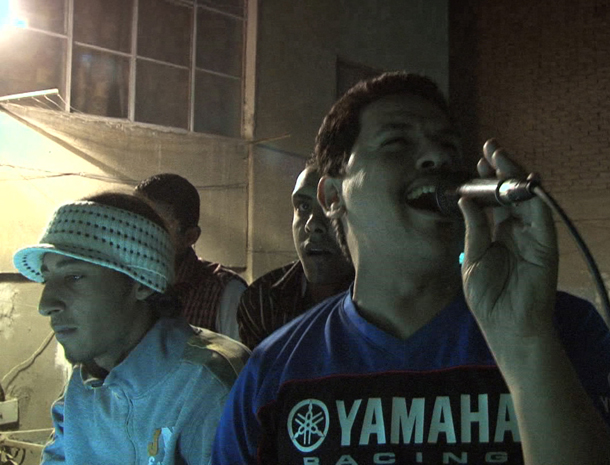
London Film Festival Review: Electro Chaabi (2013)
Director: Hind Meddeb
Country: Egypt | France
Genre: Documentary | Music
Official Trailer: Here
Editor’s Notes: The following review is part of our coverage of the BFI London Film Festival. For more information on the festival visit http://www.bfi.org.uk/lff and follow the event on Twitter at @bfi.
From documentary filmmaker Hind Meddeb, Electro Chaabi is the exploration of the Egyptian slums and the new craze that seems to be taking over: electronic chaabi music. Featuring interviews with the DJs and footage of the raving nightlife in the underworld of the slums and the effect chaabi music has on the people, Electro Chaabi is an endeavour into a civilization rocked by the revolution. Despite its quest to uncover the journey to freedom, the documentary features almost no women. This is surprising to say the least, especially as the filmmaker is herself female. Repeatedly, the DJs and musical creators talk about offering a ‘breath of freedom to Egypt’s youths’ whilst simultaneously ignoring 50% of the population. Despite its noble intentions, Electro Chaabi is somewhat contradictory of itself at heart.
Providing a soundtrack to the revolution, the documentary and the angry young men at the centre of it provide an intriguing insight into not only the reality of Egypt’s political climate, but the ever-growing fervor of a peoples who are no longer willing to sit idly by. However, here Meddeb barely scratches the surface; little explanation of the context is offered to the audience and the motivation to create chaabi music remains blurry. Though the political climate of the country is in a constant state of unrest, the reasons behind it never surface. Meddeb’s first failure lies here, as she expects a foreknowledge of such information with the DJs in Electro Chaabi repeatedly referencing details of the Hosni Mubarak that will most likely unbeknownst to the majority of audiences.
Electro Chaabi, it seems, can’t make up its mind; it attempts to present itself as a rare insight into the slums of Egypt, a way to provide a voice for the disadvantaged teens that inhabit them and a study on the marketing of music.
Oka and Ortega are the focal point of the documentary, two teens with a passion for expressing their distaste with Egypt’s politicians and electronic music. The third wheel of their dynamic duo, Weza, is just as passionate but apparently ‘less marketable’. After an offer comes up for the two youths to pursue their dreams but only under the condition that Weza is left behind, they in their blinding ambition take it. This causes the direction of Electro Chaabi to drift considerably; it thrusts itself forward into the revolution and freedom of speech whilst attempting a 180° turn into the gritty realm of musical politics, remotely resembling something from The X Factor. Electro Chaabi, it seems, can’t make up its mind; it attempts to present itself as a rare insight into the slums of Egypt, a way to provide a voice for the disadvantaged teens that inhabit them and a study on the marketing of music.
There is no doubt that chaabi music will take a worldwide foothold, thanks to the internet and other such means of file sharing, but it doesn’t seem that Electro Chaabi has much to offer western audiences thanks to its patchy look into Egyptian society and Meddeb’s discriminative study into supposed freedom of speech. If anything, Electro Chaabi highlights the social inequalities of Egypt; her complete exclusion of the female gender, with the exception of the mothers and grandmothers of the male DJs acts merely as an example of the numerous adversaries faced by Egyptian society, a society where females are seen as second class citizens. Even for its good intentions, Electro Chaabi is a shallow, concentrated and unsatisfying result of a hugely promising potential.
Related Posts
![]()
Zoe De Pasquale
![]()
Latest posts by Zoe De Pasquale (see all)




























